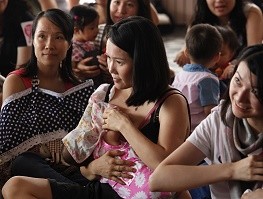China joins the United Nations International Children's Emergency Fund (UNICEF) in World Breastfeeding Week, an annual celebration that calls on fathers, families, health workers, employers, trade unions and the public to further empower mothers to breastfeed, with this year's emphasis being on working mothers.
Every year from Aug. 1-7, World Breastfeeding Week aims to promote the benefits of breastfeeding to both infants and mothers. This year, the event is dedicated to promoting breastfeeding in the workplace.
In order to promote a breastfeeding culture in China, the government is leading efforts to promote breastfeeding in all sectors of society, especially those most involved in the employment of mothers.
This year, one of the aspects of the celebrations is "10m2 of Love," a campaign UNICEF and the National Center for Women and Children's Health initiated in 2013 to promote the creation of supportive spaces in public and in the workplace for women to breastfeed. The locations are mapped on a downloadable app, so mothers can find a space whenever they need one.
According to the UNICEF website, "breastfeeding gives children the healthiest start in life and is one of the simplest, smartest and most cost-effective ways we have of ensuring that all children survive and thrive."
Worldwide, only 38 percent of children under six months old are exclusively breastfed, with the Chinese national rate dropping even lower at 28 percent. When the child turns three months old, the chances of them being breastfed drop even further, as the maternity leave granted by Chinese law ends and their mothers return to work.
Compared to other countries, China falls far behind world leaders in breastfeeding. The country with the highest breastfeeding rate is Rwanda, which despite its status of a high HIV infection rate, promotes breastfeeding by giving HIV-infected mothers proper medication and giving working mothers an hour of paid time off each day to directly breastfeed their child, allowing the country to reach a 90-percent rate of mothers who exclusively breastfeed their children.
"We welcome the Chinese government's leadership and commitment to create a culture of breastfeeding from birth in hospitals, at home and in public and work spaces. We know that in a fast changing world, where new pressures of juggling families and work [exist], continuing this age-old practice can be difficult for mothers," said Tim Sutton, UNICEF deputy representative for China.
"Yet study after study demonstrates this is the best investment in a child's survival and growth and there is no comparable substitute for a child's growth and development than breast milk," Sutton added.



























